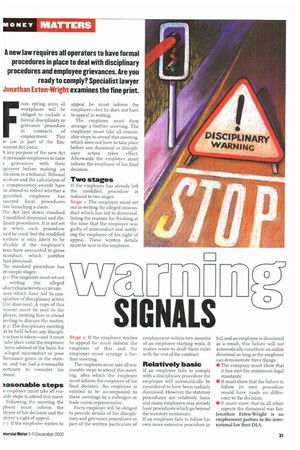SIGNALS
Page 31

If you've noticed an error in this article please click here to report it so we can fix it.
A new law requires all operators to have formal procedures in place to deal with disciplinary procedures and employee grievances. Are you ready to comply? Specialist lawyer Jonathan Exten-Wright examines the fine print.
From spring 2003 all workplaces will be obliged to include a formal disciplinary or grievance procedure in contracts of employment. This w law is part of the Em)yment Act 2002.
et key purpose of the new Act to persuade employees to raise y grievances with their players before making an plication to a tribunal. Tribunal wedure and the calculation of y compensatory awards have in altered to reflect whether a gruntled employee has tausted local procedures 'ore launching a claim.
Ihe Act lays down standard I. modified dismissal and dislinary procedures. It is not yet ar when each procedure iuld be used, but the modified icedure is only likely to be Aicable if the employee's ions have amounted to gross sconduct, which justifies tant dismissal.
he standard procedure has ee simple stages:
p I:The employer must set out writing the alleged iducticharacteristics/circumaces which have led to coniplation of disciplinary action l/or dismissal. A copy of this :ernent must be sent to the ployee, inviting him to attend teeting to discuss the matter. p 2.: The disciplinary meeting St be held before any discipliy action is taken—and it must take place until the employee been advised of the basis for alleged misconduct or poor formance given in the statent, and has had a reasonable iortunity to consider his 3onse.
Dasonable steps
e employee must take all reaable steps to attend this meet. Following the meeting the ployer must inform the ployee of his decision and the ployee's right of appeal.
p 3: If the employee wishes to
appeal he must inform the employer—but he does not have to appeal in writing.
The employer must then arrange a further meeting. The employee must take all reasonable steps to attend this meeting, which does not have to take place before any dismissal or disciplinary action takes effect. Afterwards the employer must inform the employee of his final decision.
Two stages
If the employee has already left the modified procedure is reduced to two stages:
Stage I: The employer must set out in writing the alleged misconduct which has led to dismissal, listing the reasons for thinking at the tune that the employee was guilty of misconduct and notifying the employee of his right of appeal. These written details must be sent to the employee.
Stage 2: If the employee wishes to appeal he must inform the employer of this and the employer must arrange a further meeting.
The employee must take all reasonable steps to attend this meeting, after which the employer must inform the employee of his final decision. An employee is entitled to be accompanied to these meetings by a colleague or trade union representative.
Every employer will be obliged to provide details of his disciplinary and grievance procedures as part of the written particulars of employment within two months of an employee starting work. It makes sense to draft these rules with the rest of the contract.
Relatively basic
If an employer fails to comply with a disciplinary procedure the employee will automatically be considered to have been unfairly dismissed. However, the statutory procedures are relatively basic and many employers may already have procedures which go beyond the statutory minimum.
If an employer fails to follow his own more extensive procedure in full and an employee is dismissed as a result, this failure will not automatically constitute an unfair dismissal as long as the employer can demonstrate three things: • The company must show that it has met the minimum legal standards; • It must show that the failure to follow its own procedure would have made no difference to the decision; • It must show that in all other aspects the dismissal was fair. Jonathan Exten-Wright is an employment partner in the international law firm DLA.
























































































































































